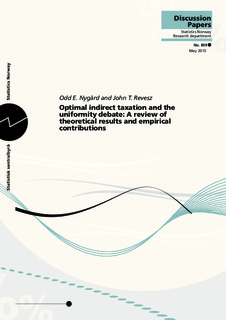Optimal indirect taxation and the uniformity debate: A review of theoretical results and empirical contributions
| dc.contributor.author | Nygård, Odd Erik | |
| dc.contributor.author | Revesz, John T. | |
| dc.date.accessioned | 2019-08-05T10:04:51Z | |
| dc.date.available | 2019-08-05T10:04:51Z | |
| dc.date.issued | 2015-05 | |
| dc.identifier.issn | 1892-753X | |
| dc.identifier.uri | http://hdl.handle.net/11250/2607129 | |
| dc.description.abstract | A review of the theoretical literature on optimal indirect taxation reveals that analytical arguments in favor of uniform indirect taxation seem weak and rather unrealistic; hence determining the optimal tax structure remains an empirical issue. However, reviewing the empirical contributions shows that most of them operate under rather restrictive and simplistic frameworks. The empirical support for uniformity seems weak, particularly when the models approach real world complexity. It appears that within a many-consumer economy, differentiated and progressive indirect taxation is likely to be the optimal solution. | nb_NO |
| dc.language.iso | eng | nb_NO |
| dc.publisher | Statistisk sentralbyrå | nb_NO |
| dc.relation.ispartofseries | Discussion papers;809 | |
| dc.subject | Optimal taxation | nb_NO |
| dc.subject | Indirect taxation | nb_NO |
| dc.subject | JEL classification: D3 | nb_NO |
| dc.subject | JEL classification: D6 | nb_NO |
| dc.subject | JEL classification: H2 | nb_NO |
| dc.title | Optimal indirect taxation and the uniformity debate: A review of theoretical results and empirical contributions | nb_NO |
| dc.type | Working paper | nb_NO |
| dc.description.version | publishedVersion | nb_NO |
| dc.source.pagenumber | 23 s. | nb_NO |
Tilhørende fil(er)
Denne innførselen finnes i følgende samling(er)
-
Discussion Papers [1003]
